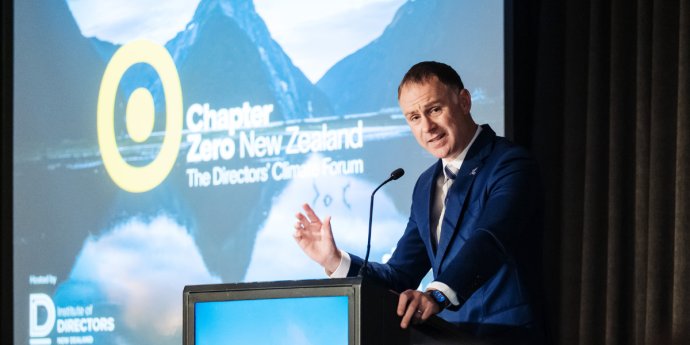Letter from Australia*: Notes from a sunburnt boardroom
From superannuation woes to AI governance, Australia’s boardrooms offer lessons for Kiwi directors in an era of complexity.
Climate Minister Simon Watts expects investment in climate action to generate economic benefits.

Growing our economy and reducing carbon emissions go hand in hand, Minister of Climate Change, Minister for Energy, Minister of Local Government and Minister of Revenue Hon Simon Watts says.
Speaking at a breakfast briefing hosted by the Institute of Director’s Chapter Zero New Zealand, Watts said New Zealand's future can be one of an abundant and affordable energy – and economic growth.
“We just need to start moving at pace and get rid of the blockages and the friction in the system that's slowing us down,” he said.
Watts was part of a two-person panel with He Pou a Rangi – Climate Change Commission Chair Dame Patsy Reddy discussing ‘The Intersection of Climate and the Economy’.
Investing in climate change and the economy at once will bring the best possible results for our country because more economic growth will provide us with more choices, Watts says.
It’s an idea backed by a recently released joint report from the OECD and the UN Development Programme, which says global growth will be 0.2 per cent higher by 2040 under an “enhanced nationally determined contributions” (NDCs) approach than under current policy settings. NDCs are a country’s plan for reducing emissions that contribute to climate change.
For Watts, the best thing the government can do is provide certainty around climate policy so that business leaders can have confidence in climate investment decisions.
“You have more power than what the government does to affect change,” he told the assembled directors and business leaders.
“Your decision making has more influence and more power, and is more agile and faster, than any government Minister, so do not think that this is just all on government.”
If the business community and government can align, “anything’s possible”, Watts says.
Questions from the audience covered topics including the impact of geopolitics, technological innovation and adaptation to the impacts of climate change.
Watts stressed we are already seeing international markets seek more assurance on the climate credentials of agricultural products, that innovation can create opportunities as well as solve problems, and that the government has set up a reference group to advise on New Zealand’s adaptation framework.
“We must have a framework that deals with the elephant in the room,” he says, which is ‘how do you share the costs?’.”
He said that New Zealand’s Emissions Trading Scheme (ETS), under which high-emissions sectors of the economy can purchase and trade carbon emissions units, will continue as an important emissions management tool.
“What we are doing as a government is ensuring, that we want, a credible ETS marketplace.”